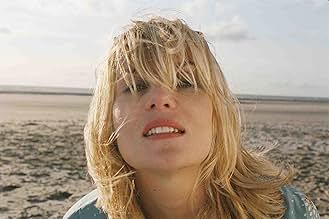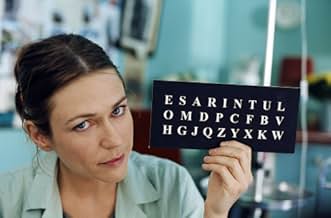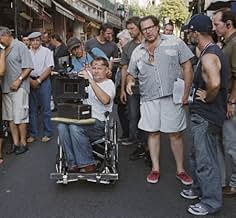La vera storia di Jean-Dominique Bauby, giornalista che nel '95, in seguito ad un incidente, finisce in coma. Quando ne esce l'unico movimento che gli è consentito è quello di una delle palp... Leggi tuttoLa vera storia di Jean-Dominique Bauby, giornalista che nel '95, in seguito ad un incidente, finisce in coma. Quando ne esce l'unico movimento che gli è consentito è quello di una delle palpebre, con la quale riesce a comunicare ed a scrivere un libro 'Lo scafandro e la farfalla'... Leggi tuttoLa vera storia di Jean-Dominique Bauby, giornalista che nel '95, in seguito ad un incidente, finisce in coma. Quando ne esce l'unico movimento che gli è consentito è quello di una delle palpebre, con la quale riesce a comunicare ed a scrivere un libro 'Lo scafandro e la farfalla'.
- Regia
- Sceneggiatura
- Star
- Candidato a 4 Oscar
- 68 vittorie e 107 candidature totali
Recensioni in evidenza
Saying more about the plot would spoil the wonderful experience of watching "The Diving Bell and the Butterfly". The camera angles/visuals are breathtaking (courtesy of two-time Oscar winning cinematographer Janusz Kaminski), and in some moments he makes us see everything from Bauby's point of view. In spite of Bauby's disability, the film is never overly melodramatic, being similar to (but even better than) "The Sea Inside" and "My Left Foot". The cast is fantastic, from Amalric to screen legend Max von Sydow, and the beautiful women in Jean-Do's life (Marie-Josée Croze, Anne Consigny and Emmanuelle Seigner, among others). The soundtrack is also memorable, including Charles Trenet's wondrous "La Mer" (which was recorded by Bobby Darin in English as "Beyond the Sea"). "The Diving Bell and the Butterfly" won the Golden Globes for best director and foreign film, and got four Oscar nominations (director, adapted screenplay, editing and cinematography - but NOT Best Foreign Film). France made the mistake of submitting the (fantastic) animation "Persepolis" instead of "Diving Bell", but they should know the Academy would never give Best Foreign Film for an animated movie, as good as it might be, and therefore neither of them got the nomination. But that's actually the Academy's fault for their stupid rules, since France should've been allowed to submit both movies. What if two of the best foreign movies of the year were from the same country? In a perfect world, there would be only a Best Picture category and films from any country and any language would be nominated, but since most people still ignore subtitles, this 'segregation' has to exist. Oh well. Oscar blunders apart, this is a film that will make you see and value the beauty of life. Bravo, Mr. Schnabel! Bravo, Monsieur Bauby! 10/10.
The first movie I saw by neo-expressionist painter Julian Schnabel was Before Night Falls. In that film, the artist was trapped in prison, quite literally. Which presented great communication difficulties for him (in giving life to his novel in the world). In this film, we have examples of people trapped or imprisoned in different ways. A man who had been taken hostage in Beirut. An ailing father who has difficulty climbing stairs to and from his apartment. Both are trying to reach out to the main protagonist. Bauby. An amazing and successful socialite who's in his very own 'prison.' Bauby has secured a publishing contract when tragedy hits. A stroke causes 'locked in' syndrome and he reviews his options as an author. The book he writes, and on which this film is based, is the one he is remembered for. I haven't read it. But his powers of expression, glimpsed in the film, make me want to buy it. The book he nearly wrote - a re-write of the Count of Monte Cristo - would probably be pulped. (But I wonder if that was poetic embellishment - Dumas was the first person to describe locked in syndrome in the person of Monsieur Noirtier de Villeforte, a Cristo character).
How many people know of Jean-Dominique Bauby, former editor of Elle fashion magazine? It doesn't matter. But what does matter is experiencing his ability to discern, his articulate vision of beauty. Not as science, but as an education of the senses (and this is a sensuous and evocative film).
Why is The Diving Bell and the Butterfly so successful? A French language film picking up four Oscar nominations is remarkable. (The American director insisted on authenticity and made it in France and in French.) I suspect the consummate vocabulary of metaphor it uses is partly responsible. It makes the challenge facing Bauby a global one and relevant to everyone's life. None of us communicates perfectly, after all. Words left unsaid, to friends, to lovers, because we didn't find the 'right' words.
The speech therapist who breaks through Bauby's barrier is excellent. Her motivation is, here is a man she respects and admires. It is also the biggest challenge of her career. Bauby's sense of humour, voiced as interior dialogue, is scathing. His lecherous thoughts about the therapist are tempered with good taste and his incorrect jokes about his own condition.
Bauby starts to write his novel and his sense of poetry bursts through. We feel a glimmer of a mental rush associated with artists, explorers and adventurers. The Diving Bell and the Butterfly is the adventure of life and death. Not in Hollywood terms with big explosions. But with sensitivities, with meanings. It has a 'reach out and touch' quality. A Laughing Buddha whose joke we've missed (but might catch on another occasion). It is the most awesomely beautiful film I have seen for a long while.
Schnabel's thing might be helping us taste something we might otherwise let go unnoticed. In Basquiat, he introduced many people to the artist Basquiat, but also to the revered and misunderstood Warhol. (And if you want to understand someone as weird as Warhol, understanding the contemporaneous and only slightly weird - Basquiat is maybe a good place to start.) Here, his insight is transcendent. The film is a work of art. About a work of art. The use of visual metaphor and an excellent script lets us use Bauby's condition symbolically. Ingenious editing keeps us on the edge of our seat, especially towards the resolution, as we race to work out how a drive in the countryside will end.
The only scene I could find a flaw in was where he shaves his father. The sound of the rasping blade as he shaved his dad troubled me if it was added afterwards I think it was overdone and distracting. But the scene was an emotional building block. And much of our story is told like this, through flashbacks. With his beautiful ex-wife. With his children. With his lover. And with his father. People with whom, like most of us, he still has one or two little unresolved issues. They made me wonder if we make too little effort to communicate when it seems easy to do so.
The film successfully mixes a down-to-earth style, great special effects to see through Bauby's one remaining eye, and jaw-dropping montage. As we observe mundane details of our hero's life falling apart or reaching fulfilment, the camera cuts to ice fields collapsing into the sea or winding back in reverse motion. Or there will be a sudden switch to sensuality as he guzzles wine and oysters in a swank restaurant, feeding and being fed by his lover. Janusz Kaminski, the cinematographer for countless Steven Spielberg's, excels, as does Oscar-winning screenwriter Ronald Harwood.
It should perhaps be noted that the film has not been immune to attempted high-jacks by groups with their own agendas. The Catholic News Service hailed its 'life-affirming qualities' compared to another great film it denigrates, The Sea Inside. Although locked-in state is a rare condition, few individuals experiencing it are likely to have the wealth and resources, public acclaim and reason to live that Bauby had. The situation of Ramon Sanpedro (The Sea Inside) might be a more common one.
The Diving Bell and the Butterfly is about Jean-Dominique Bauby, (Mathieu Amalric) a popular editor of the French fashion magazine 'Elle.' At age 43 he is stricken with a stroke leaving him with lock-in syndrome, a medical condition that, except for his left eye, rendered him completely immobile. In fear of his right eye becoming "septic" doctors quickly stitched the eye shut.
This sealing of that eye is an early scene, which is so perfectly shot that it places you inside Bauby's head and body, and keeps you there for the entire film. You see the world as he views it while desiring to be free of the paralyzing feeling of a sinking diving bell. At other times, with his imagination, you find yourself fluttering as free as a butterfly.
Bauby wrote his story with the use of a unique sequence of letters specifically designed so he could blink his eye to communicate as he created every single word of his story.
This film is in no way depressing. The cinematography is brilliantly captured. Everyone was completely captivated by the screenplay as we experienced life deep inside Bauby's body, mind and soul. For the entire 2+ hours, you won't want to be anyplace else.
Giving the film a surreal feel as though in a dream we witness a collage of memories, imaginations and actual dreams. From this, along with actual visits from loved ones we get an understanding of the man's life before the accident. It is filmed from the stroke victim's point of view. You see exactly what he sees, such as when his eye gets weak and things get blurry. We are also exposed to the man's thoughts as we hear him talking to the people about his feelings and what he wants to say despite being mute, and not being heard by the people. His thoughts give realness to the character and show us that he is still human. He even finds humor in his situation and says, to the nurse that doesn't hear him, "you need to get a sense of humor".
Overall a message about life. At the peak of this mans life an extremely severe paralysis befalls him. At first understandably pitying himself he is able to find some humor in his situation, (and parts of the movie actually make you laugh) and then inspiration. Inspiration stemming from realization that his imagination and memory are in tact. He can feel good using his mind and can even be creative and productive.
This is an anti-Hollywood, anti-formula movie. Those have their place, but this is a great antidote to the silly decisions made by inappropriately powerful studio execs.
See it. You'll be thankful you did.
Lo sapevi?
- QuizTo familiarize himself with Bauby's sheltered existence, director Julian Schnabel made the movie in the same hospital where Bauby was treated, meeting many of the orderlies who had treated him. He also shot scenes on the same balcony where Bauby relaxed, and on the same nearby beach to which his family had taken him.
- BlooperWhen Jean-Dominique goes on a boat ride, a 'Speedferries' vessel can be seen in the background. Speedferries started business in 2004, years after the movie was set.
- Citazioni
Jean-Dominique Bauby: I decided to stop pitying myself. Other than my eye, two things aren't paralyzed, my imagination and my memory.
- Colonne sonoreTheme for The Diving-Bell and the Butterfly
Composed by Paul Cantelon
Studio recording The University of Victoria
Engineer / Producer Russell Dawkin
I più visti
Dettagli
- Data di uscita
- Paesi di origine
- Sito ufficiale
- Lingua
- Celebre anche come
- El llanto de la mariposa
- Luoghi delle riprese
- Aziende produttrici
- Vedi altri crediti dell’azienda su IMDbPro
Botteghino
- Lordo Stati Uniti e Canada
- 6.003.227 USD
- Fine settimana di apertura Stati Uniti e Canada
- 75.721 USD
- 2 dic 2007
- Lordo in tutto il mondo
- 19.780.116 USD
- Tempo di esecuzione
- 1h 52min(112 min)
- Colore
- Mix di suoni
- Proporzioni
- 1.85 : 1








































